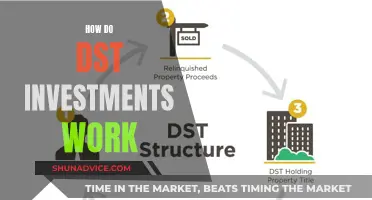
Investing in a condo can be a great way to build equity and generate passive income. However, there are several factors to consider before making this financial decision. Firstly, understand your intended use for the condo and how it aligns with the current market conditions. Condos are typically more affordable than single-family homes but may offer less control due to homeowners' associations (HOA) and their associated fees and regulations. The location of the condo is also crucial, as it can impact the property's appreciation over time. Additionally, be mindful of any restrictions imposed by the HOA, such as rental policies, which may limit your options for generating income.
What You'll Learn

HOA fees and rules
When considering investing in a condo, it is important to be aware of the Homeowners Association (HOA) fees and rules. HOA fees are monthly expenses that can be high, sometimes running into hundreds of dollars, and can negate any benefits of lower maintenance and insurance costs. These fees can also increase annually, so it is important to factor this into your budget. In addition to the fees, there may be separate annual leasing fees if you plan to rent out the condo, which can be equal to one or two times the monthly HOA fee.
HOA rules can also impact your investment. For example, some HOAs prohibit owners from renting out their units, while others may restrict the number of units that can be rented or impose a waiting period before owners are allowed to rent. It is crucial to review the HOA bylaws carefully before purchasing a condo to ensure that your intended use of the property is permitted.
Another important consideration is the possibility of special assessments, which are large, one-time fees charged by the HOA to cover immediate upgrades or expenses. These assessments can significantly impact your profitability and make the condo more difficult to sell. It is important to review the HOA's financial health and ask about any upcoming special assessments before purchasing.
Overall, while condos may offer benefits such as lower maintenance costs and desirable locations, the high HOA fees and restrictive rules can impact the profitability of your investment. It is crucial to carefully review the HOA fees and rules before making a decision.
Microsoft: A Smart Investment Choice
You may want to see also

Location and market
The location and market of your condo are key factors in determining whether or not it will be a good investment. Condos in certain markets may be cheaper to buy than single-family homes, but this also might translate to less upside when it comes to resale.
A condo in one housing market can differ vastly from a condo in another. From an investment standpoint, location is paramount. For example, a condo in Phoenix will be very different from a condo in New York City. In Phoenix, you may find more traditional two-story buildings that feel like apartments, whereas in New York, you may encounter high-rise condos with very high HOA fees.
When considering the location and market of your condo, it is also important to think about the neighborhood. Is it an emerging part of town where home prices are likely to increase? If so, you may be able to sell the condo for a profit as demand rises.
Additionally, consider the overall real estate market trends. Are home prices starting to come down, and are bidding wars becoming less common? If so, you may be able to find a bargain on a condo, especially one that needs work.
Finally, if you are purchasing a condo in a popular vacation destination, this can be a smart move as you can charge a premium for short-term rentals. However, be sure to check the local laws and condo association rules to ensure short-term rentals are permitted.
Retirement Investment Strategies: Navigating Your Golden Years
You may want to see also

Maintenance and insurance
It's also crucial to understand that these HOA fees tend to increase over time. Additionally, there may be separate annual leasing fees, which can further impact your expenses. Special assessments are another potential cost, where the HOA may require a large, one-time payment for significant repairs or upgrades. These assessments can be in the thousands of dollars and are mandatory for all owners.
When it comes to insurance, condos offer a benefit due to their shared living arrangement. Owners only need to insure the space inside their unit, resulting in lower insurance costs compared to single-family homes. However, it's important to factor in the HOA fees and any special assessments that may impact your overall insurance expenses.
Before investing in a condo, be sure to review the HOA's financials and understand their fee structure, including any potential leasing fees or special assessments. This information will help you make an informed decision about the ongoing maintenance and insurance costs associated with owning a condo.
The Debt-First Dilemma: Why Paying Off Debt Should Precede Investment Plans
You may want to see also

Rental income
One of the main reasons why people invest in a condo is to generate passive income through renting. The money you can make from renting a condo can cover your mortgage costs and HOA fees, and even bring in a profit.
However, it's important to note that not all condos allow renting. Some prohibit it altogether, while others allow only long-term rentals. Be sure to check the rules before investing in a condo.
If renting is allowed, you can expect to charge higher rent in a desirable location or if your condo offers access to common areas such as a gym or pool. These amenities can incentivize travelers or long-term renters to choose your property.
When calculating your potential rental income, be sure to factor in all the costs associated with owning a condo, such as HOA fees, homeowners insurance, property taxes, and maintenance. HOA fees, in particular, can be quite high and may increase over time. There may also be separate annual leasing fees, and special assessments for larger, immediate cash infusions. All these fees can eat into your profits, so it's important to run the numbers carefully before investing.
In addition, keep in mind that the rental process for condos can be lengthy and grueling, with lots of additional application paperwork for both you and your prospective tenants. The condo board may also restrict how many units can be rented or how soon after purchase you can start renting. These factors can impact your ability to generate rental income, so be sure to do your research beforehand.
Young Investors: Where to Begin?
You may want to see also

Financing
When applying for a condo mortgage, the lender must approve both the buyer and the community for financing. This process may be lengthier as the lender awaits specific documents from the HOA. Condo interest rates are typically slightly higher than those for single-family homes.
If you are considering a condo as your first home, it is essential to understand how HOA fees impact your mortgage approval. HOA fees reduce the amount you can borrow. For example, if your HOA fee is $200 or $400 per month, the lender may decrease your loan amount by $350,000 to $300,000.
When purchasing a condo as an investment property, it is crucial to evaluate the financials related to cash flow and potential returns. This includes considering the cash vs. mortgage calculation and HOA finances, such as special assessments.
If you are paying mortgage interest, evaluate whether you can recoup this cost by charging higher rent. Additionally, ensure you obtain the HOA's financials and inquire about any upcoming special assessments, which can significantly impact your expenses and returns.
Leaving a Lasting Legacy: Directing Your Investments to Charity
You may want to see also
Frequently asked questions
Condos are typically cheaper than single-family homes, but they also tend to appreciate in value over time. They can be a smart investment for first-time homebuyers, vacation homeowners, and rental property investors. Condos also tend to be located in desirable locations like city centres.
Condos tend to appreciate slower than single-family homes. They also come with less control due to the community's homeowners association (HOA), which collects monthly fees and sets rules for what you can and can't do with your unit. Some condos won't allow you to rent, while others will only allow long-term rentals.
You should consider your intended use of the condo, the state of the housing market in the location you're considering, and the condo association fees. It's also important to understand the bylaws and any restrictions that may apply, such as limits on renting or certain maintenance requirements.
Financing a condo is similar to financing a single-family home but can be more difficult due to extra steps and paperwork. When applying for a condo mortgage, the lender will consider both the buyer and the community itself for financing. The process may take longer, and condo interest rates are typically slightly higher than single-family home interest rates.
If you're using the condo as a rental property, the interest on your mortgage is considered a business expense and is not capped. Your property taxes are also considered a business expense and are not subject to the $10,000 tax deduction cap.







